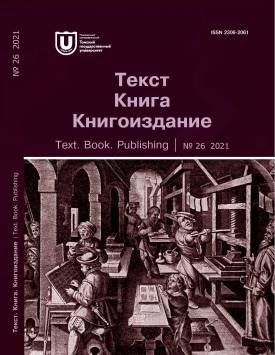Educational Periodicals in the “Court Pedagogy” of Mikhail Muravyov and Vasily Zhukovsky. Article Two
The article analyzes Vasily Zhukovsky’s journal Sobiratel’ [The Collector], which the poet published in 1829 for classes with the heir to the throne, Grand Duke Alexander Nikolaevich. The main purpose of the journal was the upbringing and education of the future sovereign. Thus, Sobiratel ’ had a similarity with “mirrors of princes” (Lat. specula principium, Fr. miroirs des princes, miroirs aux princes, Ger. Furstenspiegel) - works containing instructions to the ruler. It was to this genre that the collection Der Furstenspiegel by Johann Jacob Engel belonged; Zhukovsky was guided by this collection while working on Sobiratel’. In his journal, Zhukovsky retains Engel’s focus on edification and seriousness, but somewhat softens his monologicity and imperativeness. Sobiratel’ includes not only Zhukovsky’s own works but also selected translated passages by different authors; not all the pieces are precepts, some of them are more informative than edifying. The texts of Sobiratel’ were integrated into the educational process and directly related to the material studied in the classroom. This becomes obvious when reading the first issue of the journal, which begins with the article “View on the World and Man”. This article is consistently analyzed in the study, and the analysis reveals a fact previously unknown to researchers: the article is part of Zhukovsky’s summary of natural history, the manuscript of which is stored in the National Library of Russia. The summary is partly a free translation-retelling of textbooks on natural history published by Carl B. Von Trinius for the heir to the throne, partly a retelling of Johann G. Herder’s thoughts from Chapters 1 and 2 of Ideas for the Philosophy of the History of Mankind, partly Zhukovsky’s reflections. Apparently, the text of the summary was also influenced by the Inhabitant of the Suburb by Mikhail Muravyov (the scene of a conversation with Ilanov). Thus, the unity of the axiological and methodological approaches of Zhukovsky and Muravyov is revealed. In both cases, the factual and educational presentation of the material is an occasion for moral edification and religious and philosophical excursions. Moreover, these excursions were not random and isolated ad hoc statements, but a systematic and purposeful activity to form the student’s life attitudes. This was achieved through the moralization and poetization of the learned material, which had not only educational, but also integrative significance. They combined topics and disciplines that seemed unrelated to each other. This revealed another pedagogical attitude that brought Zhukovsky and Muravyov closer together - the desire for the universality of education. The article shows that the logic of selecting and placing materials in Sobiratel’ corresponded to the ideas of Zhukovsky’s poetic philosophy (in particular, his concept of memory) and was determined by another unpublished text of the poet - a summary on history. In fact, the first issue of Sobiratel’ is a textbook for educational notes. The common with Muravyov’s pedagogical periodicals is its emphasis on moral didactics, universalist attitude, and physical and theological theme related to the axiology of the “religion of the heart”. In terms of style and form, Sobiratel’ resembles Muravyov’s textbooks rather than periodicals. The journal is directly related to the educational process; it is emphatically edifying, does not involve games and is focused on studies, not leisure. In this sense, the opposite of Sobiratel’ wasMuraveynik [Anthill], in which the traditions of Muravyov’s periodicals were reflected not only in the content, but also in the style. The author will turn to the analysis of Muraveynik in the final, third, article of the cycle.
Keywords
court pedagogy, romanticism, Mikhail Muravyov, Vasily Zhukovsky, Alexander IIAuthors
| Name | Organization | |
| Dolgushin Dmitriy V. | Novosibirsk State University | d_dolgushin@mail.ru |
References

Educational Periodicals in the “Court Pedagogy” of Mikhail Muravyov and Vasily Zhukovsky. Article Two | Tekst. Kniga. Knigoizdanie - Text. Book. Publishing. 2021. № 26. DOI: 10.17223/23062061/26/5
